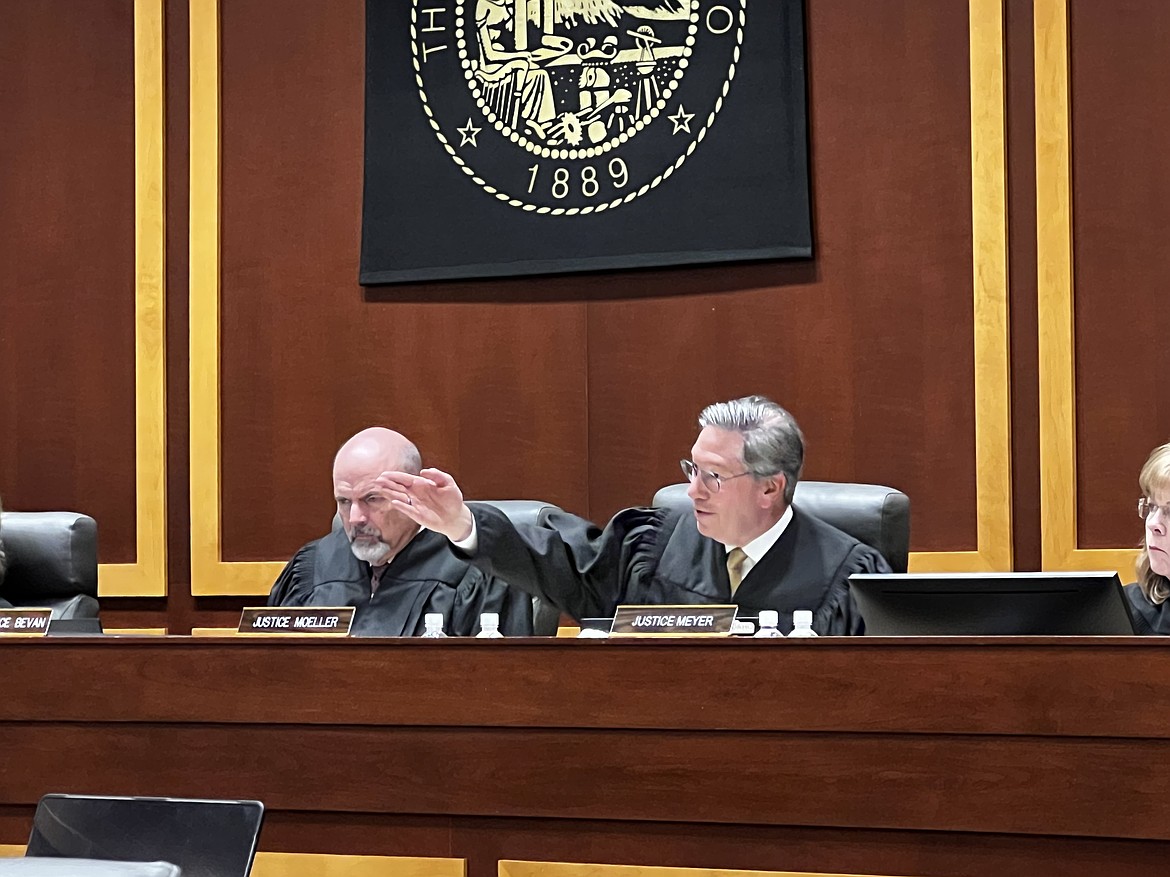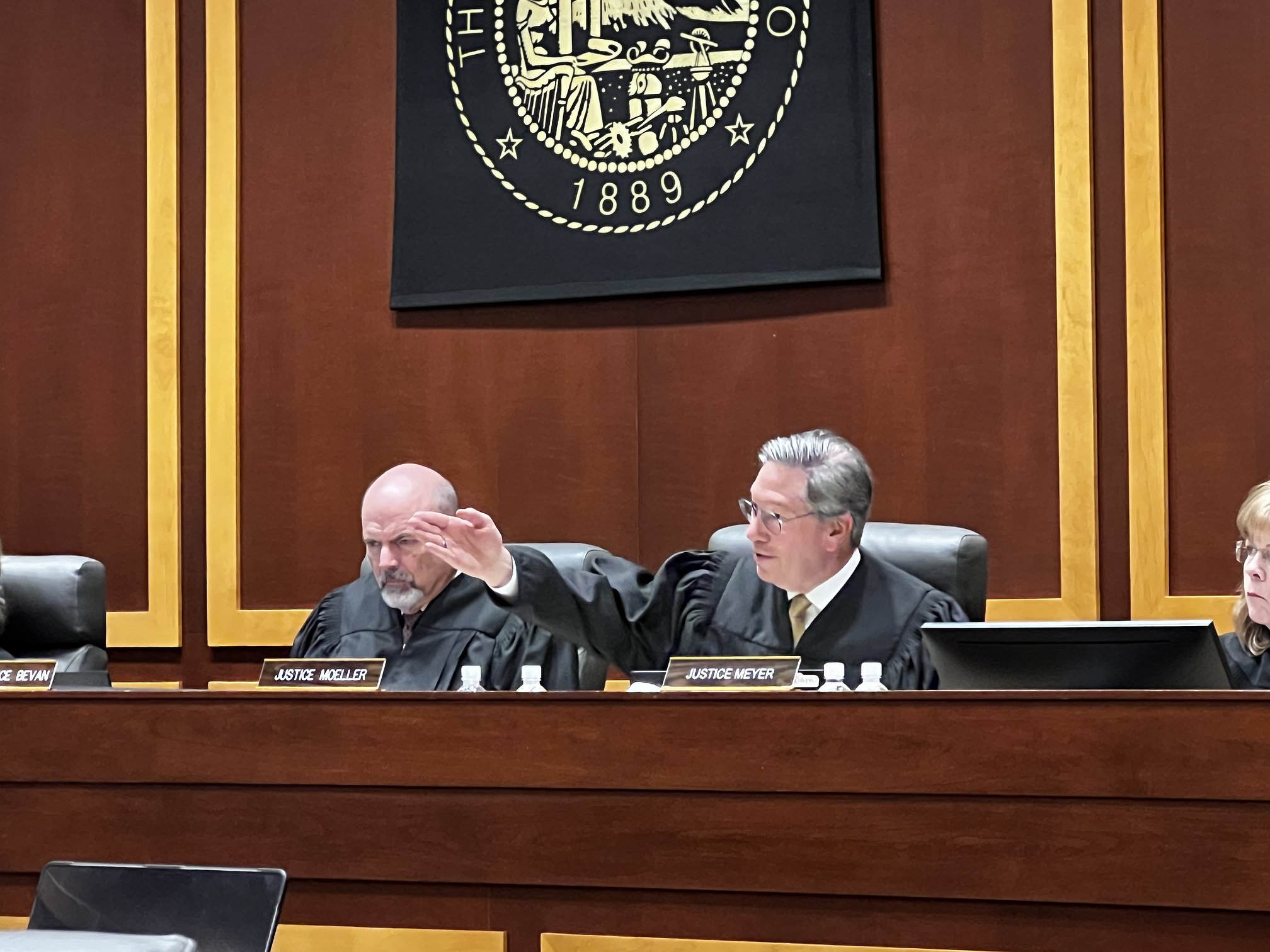Idaho Supreme Court hears road validation appeal
MOSCOW — The fate of a much-debated section of road in Shoshone County went before the Idaho Supreme Court on Wednesday at the University of Idaho.
Justices G. Richard Bevan, Robyn Brody, Gregory Moeller, Colleen Zahn and Cynthia Meyer heard oral arguments from Shoshone County Prosecutor Benjamin Allen and attorney David Claiborne inside the courtroom of the Menard Law Building concerning the appeal of a decision over West Fork Pine Creek Road.
In 2020, a section of the road was blocked by resident Joe Avery, which effectively set the legal processes in motion.
In 2022, a request for road validation was filed by Paul Loutzenhiser to the Shoshone County commissioners (BOCC), who denied the request in April 2022. Loutzenhiser, appealed this decision, but the commissioners denied it again later that year. In 2023, Loutzenhiser, along with co-applicants Robert Jutila and the North Idaho Trail Blazers appealed the board’s decision to the Idaho District Court, where Judge Susie Jensen upheld the commissioners’ ruling and denied their application.
During all three hearings, Claiborne, representing the petitioners, argued that the county was ignoring evidence that supported the road’s historical use as a public highway.
According to Claiborne, through records provided by the petitioners, the road was established and recorded by the BOCC in 1909, and since then, no record exists that Shoshone County has ever vacated or abandoned that road. During his arguments, Claiborne said this information was not given the proper level of credence by the BOCC or the lower court.
Claiborne asked the court if the foundational questions for validations were appropriately addressed during the first three attempts to validate the road. Is this a public road, and is it in the public’s interest to validate it?
“Validation is more than a determination that the public has the right to use the highway or right of way, but also a determination that the county is assuming some level of jurisdiction over the road,” Claiborne said.
According to Claiborne, Avery has received a tax exemption from the county due to the road intersecting his property. He also told the court that Shoshone County used county funds and resources to clear the blockade in 2020, which, he believes, demonstrates some level of jurisdiction over the road.
Allen argued that the BOCC was well within its authority to decline the petition based upon the findings of fact it presented during the initial hearings. However, the petitioners have stated that the decision from the BOCC didn’t satisfy its duty to provide substantial and competent evidence of its decision or the specific facts that supported its conclusion.
When the previous BOCC declined the petition, former Commissioner Mike Fitzgerald said the historical records provided by the petitioners didn’t prove the county’s interest in the road and explained that the burden of proof for any validation was on the petitioners. He and his fellow board members also brought up other concerns, including the added financial burden to the county that would come with validation, which would require surveying and subsequent maintenance.
In the former board’s decision, one of the key sticking points was that, despite a declaration of the road to be a public highway by the 1909 BOCC, there was no other record of the road being a highway, and argued that some further form of recordation was necessary. Because of this missing information and lack of any additional recordation, the road was not validly established as a public highway.
The justices received the decisions from the BOCC and the lower court before the arguments began. This prior knowledge allows them to familiarize themselves with the petition and its history. Consequently, it enables them to ask questions of the litigators as they present their arguments.
Justice Moeller challenged the lack of specificity in the county’s public interest analysis, calling it generic because it doesn’t include things like the potential impacts on things like the public, environment and traffic.
Allen was candid in responding to Justice Moeller, explaining that within the rules of road validation, a BOCC is not required to provide specifics and that the burden of proof in these petitions lies with the petitioners.
According to Allen, decisions or opinions from the Idaho Supreme Court can take several months to be rendered. Should it rule in favor of the county, it would close the book on the petition. However, if it rules in favor of the petitioners, it means the court has upheld the petitioners' arguments and could force the county to revisit the matter.



